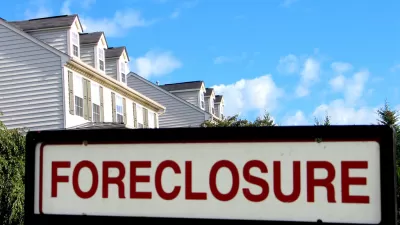Here’s what the federal government should do to grab the opportunity to create affordable housing.

Evidence of tremendous strain on tens of millions of renters across America continues to mount. Among renters in so-called Class C properties—rental properties that cater to lower-wage workers and families hit particularly hard by the pandemic—the percentage paying in full has dropped off from 46 percent to 24 percent since April, with only 12 percent of such renters paying in full on the first of October.
By now, the $1,200 stimulus checks have long since been spent. Although over 30 million Americans may be currently out of work, the $600/week extra unemployment payments ended, and Republicans in Congress oppose reinstating that benefit. Federal eviction protections (other than a recent limited public health order), and most state moratoriums, expired in late July. As a result, predictions range from 28 million to 40 million tenants at risk of evictions in the coming months, which is about 25 percent of America’s renter population. Displacement on that scale would vastly dwarf the roughly 3 million foreclosures of 2009 when the country plunged into a deep recession.
The best governmental responses to this impending disaster would be extending income benefits to unemployed Americans, providing special rental subsidies to protect tenants and support landlords, and continuing eviction and foreclosure relief.
While some states and localities are stepping up to meet the need, this support will fall vastly short of the estimated $100 billion needed. And when tenants can’t pay rent, landlords can’t pay mortgages, local taxes, or the operating expenses that allow homes to be well maintained and habitable.
This means, without federal action, there likely will be a huge wave of real estate defaults, workouts, distressed sales, and foreclosures. It does not take a crystal ball to see an impending real estate downturn.
Private Capital Is Waiting
History has taught time and again, such as during the Savings & Loan crisis of the late 1980s and the Great Recession’s foreclosure crisis of the late 2000s, that private actors stand poised to deploy capital to leverage buying opportunities when properties pass through public hands. Far too often, public agencies fail to take the long view of assets they control, or consider prioritizing public needs when developing disposition plans. Public purpose and broad mission carry little sway against the pressure to minimize current losses and reduce property inventory counts. Yet a short-term focus fails to serve the larger goal, and likely leaves society worse off in the long run.
In the current moment, we must ...
FULL STORY: Real Estate Defaults Are Coming. Don’t Waste Them.

Planetizen Federal Action Tracker
A weekly monitor of how Trump’s orders and actions are impacting planners and planning in America.

Maui's Vacation Rental Debate Turns Ugly
Verbal attacks, misinformation campaigns and fistfights plague a high-stakes debate to convert thousands of vacation rentals into long-term housing.

San Francisco Suspends Traffic Calming Amidst Record Deaths
Citing “a challenging fiscal landscape,” the city will cease the program on the heels of 42 traffic deaths, including 24 pedestrians.

Amtrak Rolls Out New Orleans to Alabama “Mardi Gras” Train
The new service will operate morning and evening departures between Mobile and New Orleans.

The Subversive Car-Free Guide to Trump's Great American Road Trip
Car-free ways to access Chicagoland’s best tourist attractions.

San Antonio and Austin are Fusing Into one Massive Megaregion
The region spanning the two central Texas cities is growing fast, posing challenges for local infrastructure and water supplies.
Urban Design for Planners 1: Software Tools
This six-course series explores essential urban design concepts using open source software and equips planners with the tools they need to participate fully in the urban design process.
Planning for Universal Design
Learn the tools for implementing Universal Design in planning regulations.
Heyer Gruel & Associates PA
JM Goldson LLC
Custer County Colorado
City of Camden Redevelopment Agency
City of Astoria
Transportation Research & Education Center (TREC) at Portland State University
Jefferson Parish Government
Camden Redevelopment Agency
City of Claremont





























